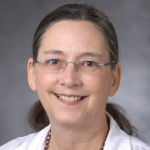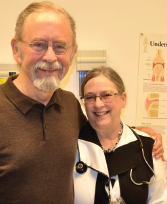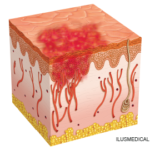Nancy Bates Allen, MD, now professor emeritus, Duke University Medical School, Division of Rheumatology and Immunology, Durham, N.C., created a legacy of clinical care, clinical research, advocacy for women and collegial respect during her 42-year career at Duke.
David S. Caldwell, MD, FACP, FACR, associate professor of medicine, Duke University School of Medicine, says, “[I’m] entering my 47th year at Duke [and] reflecting on accomplishments. Easily the one that stands out the most was convincing a young house officer, Nancy Allen, to pursue a career in rheumatology. Thankfully, she agreed.”
Career Foci: Rheumatology, then Vasculitis

Nancy Bates Allen, MD
Dr. Allen showed an early propensity for science and medicine, working at the McGuire VA Hospital in Richmond, Va., with David Propert, MD, on a summer fellowship right after high school. During subsequent summers, she worked in labs at the Medical College of Virginia, Richmond; the Karolinska Institute, Sweden; and Massachusetts General Hospital, Boston, while pursuing her Bachelor of Science in biology at Wellesley College, Massachusetts.
She attended the Medical College of Virginia (1974–75) and transferred to Tufts University School of Medicine, Boston, in 1975 to be with her husband, Barry. She and her husband moved to Duke University after she attained her MD—he to pursue graduate work in physiology, and she to begin an internship in internal medicine.
In fall 1978, she agreed to swap a pulmonary rotation with a colleague’s rheumatology rotation, and, in her words, “The rest is history!”

Dr. Allen with David S. Caldwell, MD, in the rheumatology clinic this year.
It was while she was doing rounds with Barton Haynes, MD, during her rheumatology fellowship that she became interested in the vasculitides. Her inspiration to further investigate granulomatosis with polyangiitis (Wegener’s) was drawn in part from attending a 1986 colloquy on vasculitides of the respiratory tract, convened by Dick DeRemee at the Mayo Clinic, Rochester, Minn. Dr. Allen notes, “This foundational meeting brought together about 100 enthusiastic researchers and clinicians (representing pulmonology, rheumatology, nephrology, ENT, thoracic surgery, ophthalmology, pediatrics, pathology, radiology and more) from the U.S. and Europe to share what we knew about GPA and to map out future directions.”
From a personal standpoint, the meeting was particularly memorable because of the effort she expended to get there: “My flight to the meeting was cancelled and rebooked through St. Louis to Minneapolis, where the airlines put me up overnight. Since I was pregnant with twins and sick as a dog, the next morning flight on a 10-seater to Rochester was awful. I arrived in time to give my first of two talks. In spite of this, the meeting was the absolute best of my career, and spurred me on to contribute as much as I could over the next three-plus decades.”


